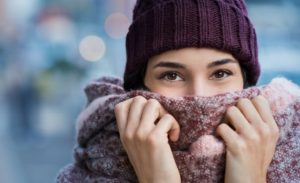 Your winter body is much different than your summer body. Some changes are noticeable, but others you may not realize. Here are 11 weird things that happen to your body more so during the winter months.
Your winter body is much different than your summer body. Some changes are noticeable, but others you may not realize. Here are 11 weird things that happen to your body more so during the winter months.
11 Things That Happen to Your Body during Winter
Your tongue it more active
Because your lips are chapped and dry, your tongue becomes more active in licking them to keep them moist. Unfortunately, saliva doesn’t keep your lips moist and further dries them out, leading to an endless cycle of dryness.
Your teeth hurt
Advertisement
Cold winter air can trigger tooth pain and heighten sensitivity. This is more common amongst individuals who already live with sensitivity. The air isn’t necessarily harming your teeth or gums, but because the air is cold, you notice is more.
Higher blood sugar
The wintertime can be a dangerous time for those with high blood sugar and diabetes. This is because extreme temperatures like heat or cold prompt the body to produce more stress hormones, which contributes to insulin resistance. It’s important that diabetics avoid exposure to extreme low temperatures and regularly monitor blood sugar levels.
You build better fat
There are two types of fat – brown and white. White fat is the type you don’t want, as it is lumpy and makes you feel bad. On the other hand, brown fat helps burn calories, as it helps to warm you up. When you’re cold, your brown fat becomes more active. You can increase your brown fat by working out in colder temperatures.
Your skin is drier
Everyone notices this common winter body change. But it’s not just the cold that leads to skin dryness; it’s lack of hydration. We tend to drink less water in the winter than we do in the summer and proper hydration is important for moist skin. Always remember to stay well hydrated!
You experience more migraines
Less sunlight means less vitamin D, which can be a trigger for those who suffer from migraines. Combine this with other triggers for migraines and you have yourself a painful winter.
Tighter muscles
Muscles are colder in the winter, which causes them to be tighter. Always ensure before partaking in an activity that you warm up properly and stretch to reduce your risk of injury.
Your arthritis can worsen
Some people blame the cold for worse arthritis symptoms, but the real culprit is barometric pressure. Changes in atmospheric pressure is when arthritis patients complain most. It’s important that you wear gloves and keep in motion in order to reduce the effects of these changes.
You can get wrinkly
Drop in humidity, reduction in blood circulation, dry wind exposure, reduced activity levels, and increase in sun exposure bouncing from snow and ice can all increase the appearance of wrinkles.
Your asthma may worsen
Advertisement
Aside from it being cold and flu season, you are more likely to be cooped indoors with dust and other indoor pollutants, which can trigger your asthma.
Your nose can make you sick
Studies out of Yale have confirmed that a cold nose increases your risk of being sick. When heading out, ensure your nose is kept warm using a scarf.
Also Read:
